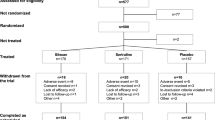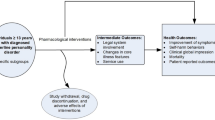Abstract
Background Patients with depression can be mistakenly labeled as treatment-resistant if they fail to receive an adequate first-line antidepressant trial. Adding second-line agents to the treatment regimens can create an additional burden on both the patients and the healthcare system. Objectives To determine if depressed patients receive an adequate antidepressant trial prior to starting second-line therapy and to investigate the association between the type of second-line treatment and severity of illness or depression among unipolar versus bipolar patients. Setting Oklahoma Medicaid claims data between 2006 and 2011. Methods Subjects were depression-diagnosed adult patients with at least two prescriptions of antidepressants followed by a second-line agent. Patients were categorized into one of three groups: an atypical antipsychotic, other augmentation agents (lithium, buspirone, and triiodothyronine), or adding antidepressants, based on the type of second-line therapy. An adequate trial was defined per the American Psychiatric Association guidelines. Factors associated with the type of treatment were tested using multinomial logistic regression models stratified by type of depression (unipolar vs. bipolar patients). Main outcome measure Variables used to measure receiving an adequate antidepressant trial included: trial duration, adherence, dose adequacy, and number of distinct antidepressant trials. Results A total of 3910 patients were included in the analysis. Most subjects reached the recommended antidepressant dose. However, 28 % of patients had an antidepressant trial duration <4 weeks and only 60 % tried at least two antidepressant regimens prior to adding second-line therapy. Approximately 50 % of the subjects were non-adherent across all groups. Severity of illness and receipt of an adequate antidepressant trial were not predictors of the type of second-line treatment. Conclusion Many patients do not receive an adequate antidepressant trial before starting a second-line agent. The type of second-line treatment was independent of severity of depression. These findings support policies that require reviewing the recommended dose and duration of the first-line antidepressant before adding second-line agents. Healthcare providers need to review the patient’s history and reconsider the evidence for prescribing second-line agents.

Similar content being viewed by others
References
Kessler RC, Berglund P, Demler O, Jin R, Koretz D, Merikangas KR, et al. The epidemiology of major depressive disorder: results from the National Comorbidity Survey Replication (NCS-R). JAMA. 2003;289(23):3095–105.
Fava M. Diagnosis and definition of treatment-resistant depression. Biol Psychiatry. 2003;53(8):649–59.
American Psychiatric Association (Internet). Practice guidelines for the treatment of patients with major depressive disorder (cited 2015, July 8). http://psychiatryonline.org/pb/assets/raw/sitewide/practice_guidelines/guidelines/mdd.pdf (2010).
Nelson JC. The STAR*D study: a four-course meal that leaves us wanting more. Am J Psychiatry. 2006;163(11):1864–6.
Nierenberg AA, Amsterdam JD. Treatment-resistant depression: definition and treatment approaches. J Clin Psychiatry. 1990;51(Suppl):39–47 (discussion 48–50).
Shelton RC, Osuntokun O, Heinloth AN, Corya SA. Therapeutic options for treatment-resistant depression. CNS Drugs. 2010;24(2):131–61.
National Guideline Clearinghouse (Internet). Diagnosis and treatment of depression in adults: 2012 clinical practice guidelines (cited 2015, Oct 9). http://www.guideline.gov/content.aspx?id=39432 (2012).
Kornstein SG, Schneider RK. Clinical features of treatment-resistant depression. J Clin Psychiatry. 2001;62(Suppl 16):18–25.
Bull SA, Hu XH, Hunkeler EM, Lee JY, Ming EE, Markson LE, et al. Discontinuation of use and switching of antidepressants: influence of patient–physician communication. JAMA. 2002;288(11):1403–9.
Trivedi MH, Lin EH, Katon WJ. Consensus recommendations for improving adherence, self-management, and outcomes in patients with depression. CNS Spectr. 2007;12(8 Suppl 13):1–27.
Sheehan DV, Keene MS, Eaddy M, Krulewicz S, Kraus JE, Carpenter DJ. Differences in medication adherence and healthcare resource utilization patterns: older versus newer antidepressant agents in patients with depression and/or anxiety disorders. CNS Drugs. 2008;22(11):963–73.
Givens JL, Datto CJ, Ruckdeschel K, Knott K, Zubritsky C, Oslin DW, et al. Older patients’ aversion to antidepressants. A qualitative study. J Gen Intern Med. 2006;21(2):146–51.
Hunot VM, Horne R, Leese MN, Churchill RC. A cohort study of adherence to antidepressants in primary care: the influence of antidepressant concerns and treatment preferences. Prim Care Companion J Clin Psychiatry. 2007;9(2):91–9.
Karve S, Cleves MA, Helm M, Hudson TJ, West DS, Martin BC. Good and poor adherence: optimal cut-point for adherence measures using administrative claims data. Curr Med Res Opin. 2009;25(9):2303–10.
Andrade SE, Kahler KH, Frech F, Chan KA. Methods for evaluation of medication adherence and persistence using automated databases. Pharmacoepidemiol Drug Saf. 2006;15(8):565–74 (discussion 575–567).
Liu X, Tepper PG, Able SL. Adherence and persistence with duloxetine and hospital utilization in patients with major depressive disorder. Int Clin Psychopharmacol. 2011;26(3):173–80.
Wu CH, Farley JF, Gaynes BN. The association between antidepressant dosage titration and medication adherence among patients with depression. Depress Anxiety. 2012;29(6):506–14.
Charlson ME, Pompei P, Ales KL, MacKenzie CR. A new method of classifying prognostic comorbidity in longitudinal studies: development and validation. J Chronic Dis. 1987;40(5):373–83.
Gibson TB, Jing Y, Smith Carls G, Kim E, Bagalman JE, Burton WN, et al. Cost burden of treatment resistance in patients with depression. Am J Manag Care. 2010;16(5):370–7.
Petersen T, Papakostas GI, Posternak MA, KantA GuykerWM, Iosifescu DV, et al. Empirical testing of two models for staging antidepressant treatment resistance. J Clin Psychopharmacol. 2005;25(4):336–41.
Correa R, Akiskal H, Gilmer W, Nierenberg AA, Trivedi M, Zisook S. Is unrecognized bipolar disorder a frequent contributor to apparent treatment resistant depression? J Affect Disord. 2010;127(1–3):10–8.
Vazquez G, Tondo L, Baldessarini RJ. Comparison of antidepressant responses in patients with bipolar vs. unipolar depression: a meta-analytic review. Pharmacopsychiatry. 2011;44(1):21–6.
Crown WH, Finkelstein S, Berndt ER, et al. The impact of treatment-resistant depression on health care utilization and costs. J Clin Psychiatry. 2002;63(11):963–71.
Russell JM, Hawkins K, Ozminkowski RJ, Orsini L, Crown W, Kennedy S, et al. The cost consequences of treatment-resistant depression. J Clin Psychiatry. 2004;65(3):341–7.
Greenberg P, Corey-Lisle PK, Birnbaum H, Marynchenko M, Claxton A. Economic implications of treatment-resistant depression among employees. Pharmacoeconomics. 2004;22(6):363–73.
Jing Y, Kalsekar I, Curkendall SM, Carls GS, Bagalman E, Forbes RA, et al. Intent-to-treat analysis of health care expenditures of patients treated with atypical antipsychotics as adjunctive therapy in depression. Clin Ther. 2011;33(9):1246–57.
Olfson M, Marcus SC, Druss B, Elinson L, Tanielian T, Pincus HA. National trends in the outpatient treatment of depression. JAMA. 2002;287(2):203–9.
Fullerton CA, Busch AB, Normand SL, McGuire TG, Epstein AM. Ten-year trends in quality of care and spending for depression: 1996 through 2005. Arch Gen Psychiatry. 2011;68(12):1218–26.
Ucok A, Gaebel W. Side effects of atypical antipsychotics: a brief overview. World Psychiatry. 2008;7(1):58–62.
Funding
No funding was requested or received in conjunction with this project. Oklahoma Medicaid data was provided by the Oklahoma Healthcare Authority, under a contract with the University of Oklahoma College of Pharmacy.
Conflicts of interest
The authors report no actual or possible conflicts of interest, including financial, personal or other relationships with other individuals or organizations that might inappropriately influence or could be perceived to influence their work.
Author information
Authors and Affiliations
Corresponding author
Rights and permissions
About this article
Cite this article
Hassan, A.K., Farmer, K.C., Brahm, N.C. et al. Evaluating antidepressant treatment prior to adding second-line therapies among patients with treatment-resistant depression. Int J Clin Pharm 38, 429–437 (2016). https://doi.org/10.1007/s11096-016-0272-y
Received:
Accepted:
Published:
Issue Date:
DOI: https://doi.org/10.1007/s11096-016-0272-y




